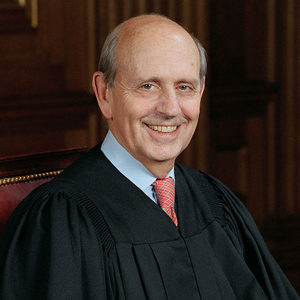Breyer: Country's 'stronger tradition of civil liberties' makes another mass internment unlikely

Justice Stephen G. Breyer
Justice Stephen G. Breyer on Sunday refused to say what he thinks of Donald Trump’s call to temporarily ban Muslim immigration, but the justice did say he thinks mass internment is an unlikely prospect in the United States.
In an interview with ABC News, Breyer said the issue of Muslim immigration is “highly political.”
“I think every person in the United States has a right to an opinion on that, which he can express publicly, except for me,” Breyer said. “And if I have an opinion,” he said, “I might talk to my wife about it, but I’m not going to talk to you.” ABC News, the Washington Post and the Hill have stories on the interview.
Breyer added that his acquaintances think the 1944 U.S. Supreme Court decision Korematsu upholding the internment of Japanese Americans was wrongly decided, though it was never overturned. Trump has cited the case to support his call for a ban on Muslim immigrants.
Breyer said, however, that he doesn’t think there would be another mass internment here because “this country has developed stronger traditions of civil liberties.”
Asked if he would delay retirement if Donald Trump becomes president, Breyer said a lot of personal factors come into play in a retirement decision. Pressed for a response, Breyer said, “I know you were asking a direct question. And I’m giving you an indirect response.”
Breyer will be 78 when the next president takes office. Three other justices will be older than 80, the Washington Post says.



